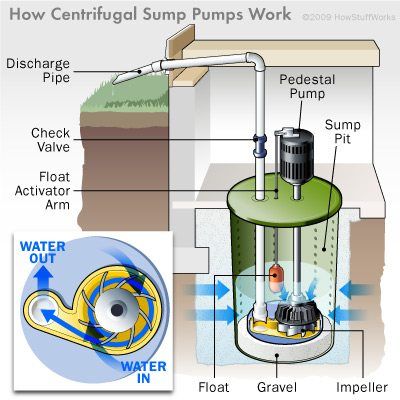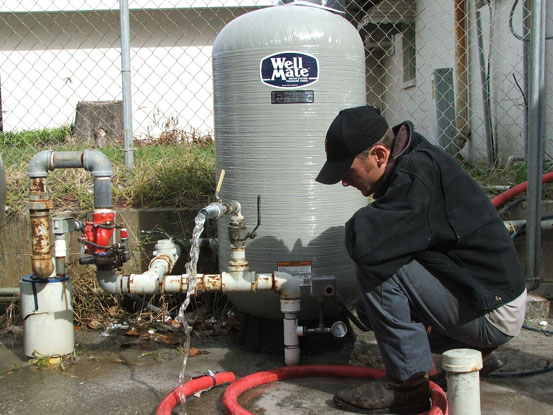Seamless Well Pump Replacement: Restoring Your Supply Of Water with Accuracy
Seamless Well Pump Replacement: Restoring Your Supply Of Water with Accuracy
Blog Article
Comprehending the Secret Components of Effective Water Filtration Systems

Value of Water Filtration Equipment
Water purification systems play a critical function in making certain accessibility to tidy and secure drinking water by efficiently getting rid of contaminations and contaminants. These systems are important in attending to the expanding issues over water top quality and the possible health dangers related to eating infected water. By utilizing various purification systems such as reverse osmosis, turned on carbon, and UV sterilization, water purification systems can successfully remove dangerous materials like bacteria, infections, hefty steels, and chemicals from the water supply.
Additionally, water filtration systems aid to enhance the taste and smell of water by getting rid of chlorine, sediments, and other pollutants that can affect its high quality. Pump repairs & installation. This enhancement in water high quality not just makes it more palatable but also encourages people to consume an adequate amount of water daily, promoting better hydration and overall wellness
Kinds of Filtering Elements

Physical filters are made to physically strain out impurities from the water. These filters can be made from materials like ceramic, carbon, or also sand, and they function by capturing fragments bigger than the filter's pores as water passes with.
Chemical filters make use of different chemical processes to get rid of contaminants from the water. Examples include turned on carbon filters, which adsorb pollutants, and turn around osmosis membrane layers, which make use of pressure to different contaminants from the water.
Biological filters utilize living microorganisms like bacteria or algae to break down natural matter and toxins in the water. These filters are typically utilized in wastewater therapy plants or all-natural water filtration systems.
Recognizing the various sorts of filtration components is vital for picking one of the most appropriate water filtration system for specific purification requirements.
Feature of Sediment Filters
Debris filters play an important function in water filtering systems by efficiently capturing strong particles put on hold in the water. These filters are typically the very first line of protection in a filtering system, eliminating bigger fragments such as sand, silt, dust, and rust before the water relocates through finer purification phases. By capturing these sediments, the filters prevent them from getting to downstream parts, therefore prolonging the life-span and performance of the whole system.
The function of sediment filters is vital in preserving water quality and shielding delicate tools from damage brought on by debris. Furthermore, by getting rid of noticeable particles, sediment filters improve the quality and preference of the water. Frequently cleaning or replacing sediment filters is necessary to guarantee optimal efficiency. Overlooking this maintenance can result in clogging, reduced water flow, and compromised purification efficiency. On the whole, sediment filters are indispensable elements that add considerably to the performance of water filtering systems.
Duty of Turned On Carbon Filters
Playing an important role in water filtration systems, triggered carbon filters contribute in removing pollutants and impurities from the water system. These filters are developed to adsorb and trap a vast array of toxins, consisting of chlorine, unstable natural compounds (VOCs), pesticides, and herbicides. The turned on carbon material has a big area, permitting the reliable capturing of pollutants with a procedure called adsorption. As water passes via the filter, the turned on carbon holds and brings in onto the pollutants, making certain that the water that appears beyond is cleaner and much safer for usage.
Turned see on carbon filters are highly reliable at enhancing the preference and smell of water by why not try these out lowering chemicals that can impact its quality. Due to their versatility and integrity, turned on carbon filters are a vital element in ensuring that water is detoxified to the highest standards before reaching customers.
Understanding Reverse Osmosis Solutions
Reverse osmosis systems are innovative water purification systems that use an advanced process to get rid of contaminants and pollutants from drinking water. These systems work by using pressure to the water, compeling it via a semi-permeable membrane. This membrane functions as a barrier, enabling just distilled water molecules to travel through, while obstructing larger particles such as minerals, chemicals, and various other impurities. Because of this, the water that comes out on the other side is significantly cleaner and much safer for consumption.
One trick benefit of reverse osmosis systems is their ability to get rid of a large range of pollutants, consisting of heavy metals, dissolved viruses, germs, and solids. This makes them highly reliable in boosting the general high quality and security of drinking water. Additionally, reverse osmosis systems are relatively low-maintenance and can be set up under the sink or in a main filtration system, offering practical accessibility to tidy water throughout the family. In general, understanding how reverse osmosis systems function can help individuals make informed decisions about their water filtration demands.
Verdict
To conclude, reliable water filtering systems are critical for making sure clean and secure drinking water. The crucial components of these systems consist of debris filters, activated carbon filters, and turn around osmosis systems. By comprehending the feature and duty of each component, people can make educated choices when selecting a water filtering system. It is essential to focus on the quality of water in order to promote overall health and well-being.
Water purification systems play an important duty in making certain accessibility to clean and secure drinking water by efficiently removing pollutants and contaminations. By utilizing different filtration systems such as reverse osmosis, triggered carbon, and UV sanitation, water filtration systems can effectively eliminate dangerous materials like germs, viruses, hefty steels, and chemicals from the water supply.
Sediment filters play a critical role in water purification systems by successfully capturing solid particles put on hold in the water (Water Softeners).Playing a crucial function in water filtration systems, triggered carbon filters are important in removing contaminations and pollutants from the water supply.Reverse osmosis web systems are innovative water filtration systems that utilize an innovative procedure to get rid of impurities and impurities from alcohol consumption water
Report this page